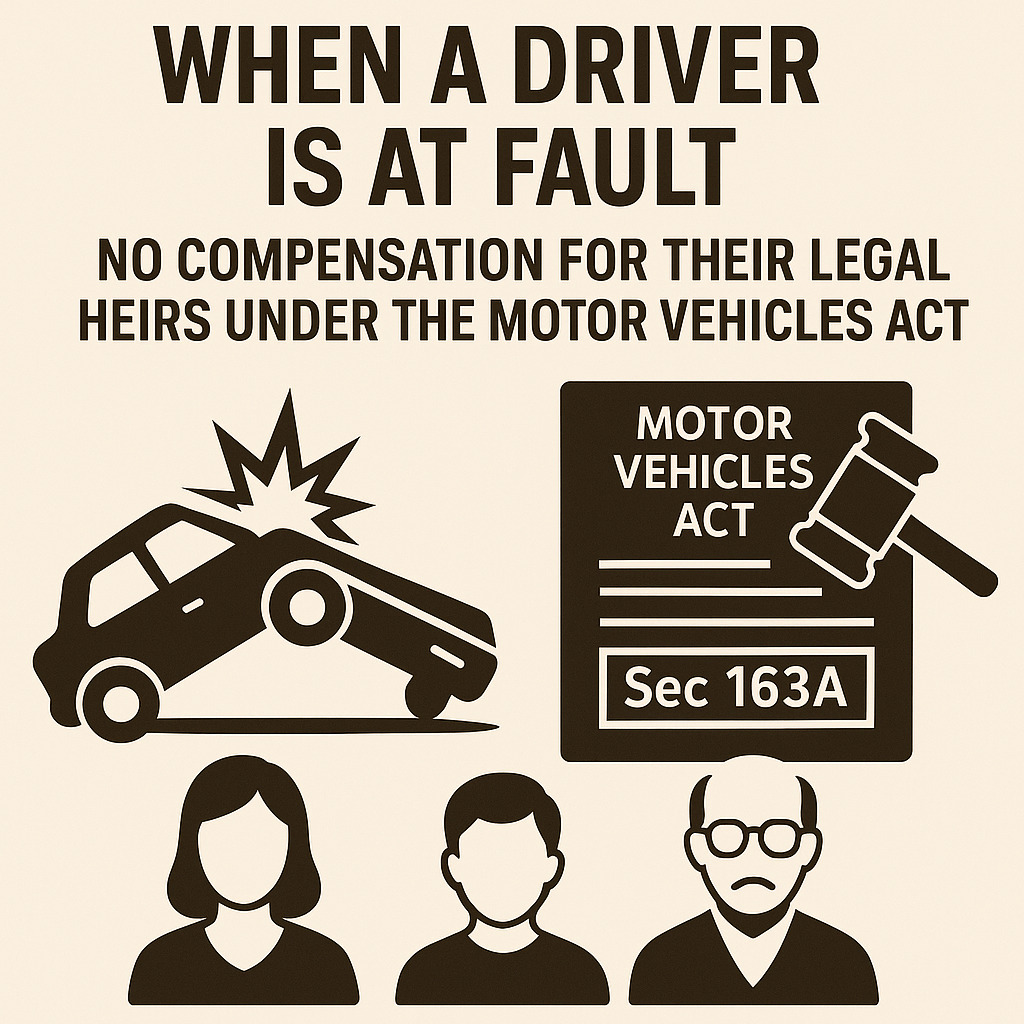View News
No-Compensation-for-Their-Legal-Heirs-Under-the-Motor-Vehicles-Act

When a Driver Is at Fault: No Compensation for Their Legal Heirs Under the Motor Vehicles Act
Introduction
In a landmark ruling dated July 2, 2025, the Hon’ble Supreme Court of India reaffirmed a vital principle under motor vehicle law: no compensation is payable under Section 163A of the Motor Vehicles Act, 1988, when the deceased was himself responsible for the accident. The Court held that legal heirs of a driver who dies due to his own rash or negligent driving cannot be considered third-party beneficiaries, and thus, are not entitled to no-fault compensation.
Factual Background
The case stemmed from a tragic accident on June 18, 2014, where a Fiat Linea car overturned, resulting in the driver's death. His family—comprising his wife, son, and parents—claimed ?80 lakh as compensation under Section 163A, arguing that the accident was caused by a tire burst.
However, the police chargesheet and eyewitness testimony pointed clearly to reckless and negligent driving as the actual cause. Based on this, both the Motor Accidents Claims Tribunal and the Karnataka High Court rejected the claim, applying the "self-tortfeasor" principle—that a person cannot claim compensation for injury or death caused by their own wrongdoing.
The Legal Principle: No-Fault Liability Has Limits
Under Section 163A, the Motor Vehicles Act provides for a no-fault compensation scheme, allowing victims or their legal heirs to claim compensation without proving negligence on the part of another. However, the Supreme Court emphasized a critical limitation:
“No-fault liability under Section 163A does not extend to cases where the death or injury is self-inflicted due to the deceased’s own rash and negligent driving.”
Thus, legal heirs of such drivers cannot be treated as third-party claimants.
Reinforcing Precedents
The Court relied on a consistent line of precedents, including:
-
Ningamma v. United India Insurance Co. Ltd. [(2009) 13 SCC 710]
Held that the legal heirs of a deceased borrower-driver are not third parties, and therefore not eligible under Section 163A. -
National Insurance Co. Ltd. v. Ashalata Bhowmik [(2018) 9 SCC 801]
Ruled that in cases of death due to own negligence, the only possible remedy lies in the Personal Accident (PA) Cover, and not under Section 163A or Section 166.
The Court reiterated that allowing such claims would distort the intent of the no-fault regime, and create a precedent for profiting from one's own wrongful act, which the law cannot permit.
Key Implications of the Judgment
-
Clear Boundary on Section 163A Claims
The ruling distinguishes legitimate no-fault claims from self-inflicted accidents, bringing clarity and consistency. -
Relief Only for Innocent Victims
Section 163A is intended to compensate innocent third parties, not those responsible for causing the accident. -
Insurer's Right to Deny
Insurance companies are now legally fortified in denying claims from legal heirs of a negligent deceased driver under 163A. -
Promotion of Road Discipline
The judgment indirectly encourages responsible driving, by ensuring that negligence is not rewarded.
Alternative Relief: Personal Accident (PA) Cover
While Section 163A claims are barred in self-caused deaths, legal heirs may still receive compensation under the vehicle’s Personal Accident Insurance—a contractual cover between the insured and insurer. The PA cover typically compensates for death or bodily injury, regardless of fault, and serves as an alternate route for financial redressal, subject to policy terms.
Practical Legal Guidance
-
For Legal Heirs: Avoid pursuing 163A claims where police or tribunal records establish driver negligence. Instead, examine the PA coverage under the deceased’s insurance policy.
-
For Lawyers & Tribunals: Be cautious in entertaining or advising claims under 163A in cases involving self-tortfeasor deaths, and rely on authoritative judgments including:
-
Ningamma (2009)
-
Ashalata Bhowmik (2018)
-
Supreme Court Decision (2025)
-
Conclusion
This 2025 ruling by the Supreme Court strengthens a long-standing jurisprudential boundary: Section 163A applies only to innocent third-party victims, and not to drivers whose own fault causes their death. Legal heirs in such cases are not considered third-party claimants, and are therefore ineligible for no-fault compensation under this provision.
By drawing a clear line between fault and no-fault compensation, the judgment preserves the legislative intent of Section 163A, protects insurance integrity, and upholds fairness within India's motor accident compensation regime.
"Unlock the Potential of Legal Expertise with LegalMantra.net - Your Trusted Legal Consultancy Partner”
Disclaimer: Every effort has been made to avoid errors or omissions in this material in spite of this, errors may creep in. Any mistake, error or discrepancy noted may be brought to our notice which shall be taken care of in the next edition In no event the author shall be liable for any direct indirect, special or incidental damage resulting from or arising out of or in connection with the use of this information Many sources have been considered including Newspapers, Journals, Bare Acts, Case Materials , Charted Secretary, Research Papers etc
Prerna Yadav
LegalMantra.net Team

